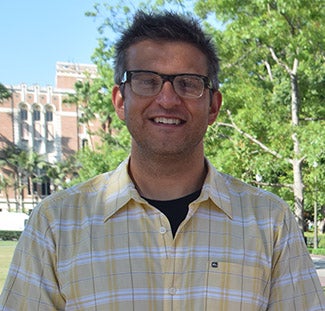Center for Advanced Genocide Research Awards USC Graduate Student Research Fellowship to Piotr Florczyk
The staff of the USC Shoah Foundation Center for Advanced Genocide Research had a dilemma on their hands. They could only choose one applicant to award the 2016 Graduate Summer Research Fellowship – but they couldn’t bring themselves to turn away their runner-up, Piotr Florczyk, because his proposal was so fascinating.
It’s easy to see why. Florczyk, a PhD candidate in the USC Literature and Creative Writing program, intends to write poetry inspired by the testimonies of Polish Holocaust survivors in the archive.
In order to support Florczyk’s research, the Center created a special “Honorable Mention” abridged fellowship for Florczyk and invited him to spend two weeks conducting research in the Visual History Archive at the Center this summer.
Florczyk, a poet, literary translator and university instructor, said his work has long been focused on history, World War II and the Holocaust (and, as a teenager in Krakow, Poland, he remembers Steven Spielberg’s film crew coming to his school to cast extras for Schindler’s List). But now he wants to write poetry in an entirely new way – by using the words of survivors in the VHA to inspire his own interpretation of the Holocaust.
“What I would like to avoid is simply retelling the narration, the narrative that I’ve heard [in the testimony] because the way [the survivors] say it in their own words is by far the best. That can’t be surpassed,” Florczyk said. “What I want to do instead is be inspired by their experiences and narrative.”
He has focused his research on testimonies of Polish Jews who talk about places in and around Krakow that Florczyk himself knows very well from his childhood and visiting his family who still lives there. For example, he was amazed to find a testimony of a survivor who describes hiding for two months in a 12th century abbey that is visible from the swimming pool he and his family go to all the time. But although the places may still look the same, he can’t help but notice how different his hometown was before and during the Holocaust compared to when he was growing up.
“Every time someone mentioned an address I went online and looked it up and said ‘Of course, I know this intersection or this street’ or ‘Look at that, that house is still standing,’” Florczyk said. “It’s been really rewarding to listen to these stories and understand how different Polish society was at the time.”
Florczyk’s process has been to jot down notes while watching each testimony, and then go back later and write lines of poetry based on what he heard. He plans to draw inspiration from the testimonies, not copy the survivors’ words word-for-word.
He has been paying particular attention to unique images and turns of phrase that survivors use and experiences that are different in some way from more common narratives of the Holocaust. He’ll also explore themes of assimilation and education.
Florczyk is also interested in how survivors use language, and how their languages and accents influenced their ability to survive.
“I’m really interested in how people speak and what does the way people speak tell us about them and their experiences,” he said.
He’s not sure what form his poems will take, whether a suite of several shorter poems, one long poem, or something else, but Florczyk said he is grateful for the opportunity to come to the Center and get the chance to explore the Visual History Archive.
“The archives and the testimonies are just amazing,” he said.
